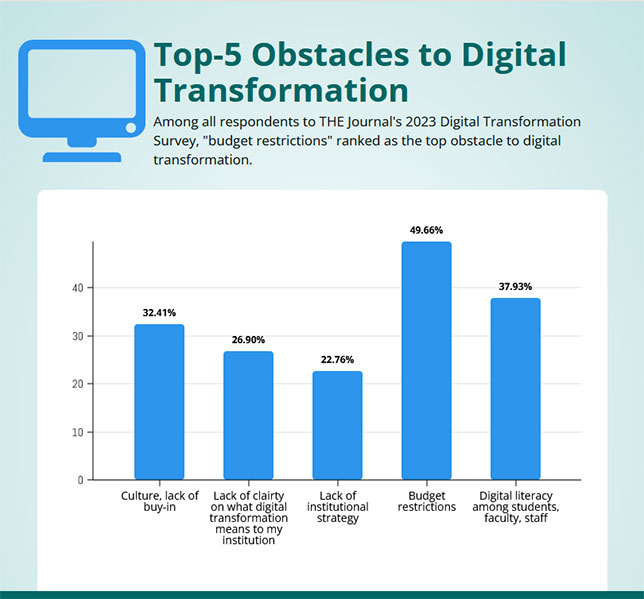Selected Articles: David Nagel
David Nagel is editorial director of 1105 Media's Education Group and editor-in-chief of THE Journal. The articles listed below represent a sampling of his recent work. To find the 1,000 most recent articles by David, please use our online search tool.
A survey of nearly 1,000 parents revealed that only a small minority oppose the use of generative AI tools like ChatGPT for academic help in schools.

Campus Technology sits down with David Weil, Vice President and Chief Information and Analytics Officer, Information Technology & Analytics, at Ithaca College, who will be delivering talks on both AI and data and analytics at the upcoming Tech Tactics in Education Conference, to be held Nov. 7–9 in Orlando, FL.

Even with the massive influx of technology spending in K–12 over the last few years, digital transformation in schools continues to be a work in progress.
A national survey of educators and a survey of parents revealed the top concerns of both groups going into the 2023–2024 school year. Both cited "unfinished learning" from the 2021–2022 school year as one of their major issues.

AI writers like ChatGPT can often produce work that is, at least on first glance, indistinguishable from human writing. With a simple prompt like "write an essay on symbolism in Joseph Conrad's Heart of Darkness," ChatGPT can spit out an organized, coherent, expository essay in seconds. And no two essays will be identical.
Artificial intelligence will experience more than a tenfold growth in the education sector over the next eight years. According to a new forecast by P&S Intelligence, expenditures for AI by schools will grow from $2.13 billion in 2022 to $25.77 billion in 2030.
Most of the United States saw declines in reading and math achievement on standardized tests between 2019 and 2022. Those declines happened in both fourth- and eighth-grade in a large majority of states and jurisdictions.
Project Tomorrow presented findings from its latest SpeakUp Survey in a briefing to Congress today. SpeakUp is the largest research project focusing on education technology, averaging well over 300,000 participants each year since its launch. The latest research captured changes in attitudes and priorities from administrators, teachers, and students.
A large majority of students age 10 and younger are being taught STEM at school, and parents can't seem to get enough of it. A survey of 1,000 parents of students aged 10 and younger found that 78% reported that their kids are learning STEM-based curricula at least weekly. And 73% of parents want schools to adopt more STEM learning.
Network security in schools and libraries is both urgent and deserving of funding through the federal E-rate program, according to the latest E-rate Trends Report, released today by E-rate services and support firm Funds for Learning.